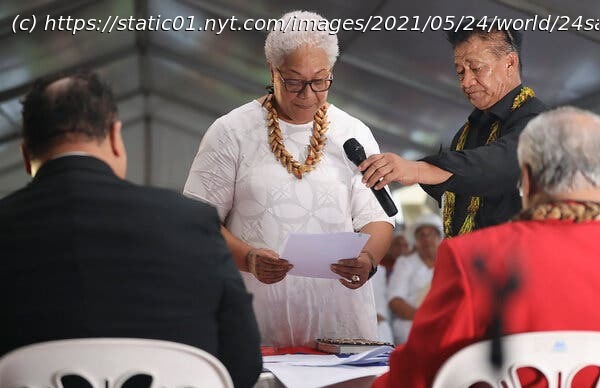A constitutional crisis deepened in the Pacific Island nation, which now has two competing governments and two claimants to the prime ministership.
Fiame Naomi Mata’afa walked toward Samoa’s beehive-shaped Parliament House on Monday morning intending to be sworn in as the first female prime minister in the Pacific Island nation’s 56-year history. What she and her fellow party members found instead were locked doors. The speaker of Parliament had issued orders to keep them out. And so deepened a constitutional crisis that has convulsed this long-stable nation and thrown into doubt whether Ms. Mata’afa, whose party won the April 9 election, would actually take office. Still shut out of Parliament by Monday evening, Ms. Mata’afa’s party held its own swearing-in under a tent erected right outside. As the sun set, she took the oath of office, flanked by members of her party dressed in cardinal-red blazers and traditional men’s wraparound skirts known as ie faitaga. With the party’s defiant act, the country now has two competing governments and two claimants to the prime ministership. Each side has accused the other of carrying out a coup. The incumbent prime minister, Tuilaepa Aiono Sailele Malielegaoi, who has led Samoa for 23 years, and members of his political party were nowhere in sight during Ms. Mata’afa’s ceremony. He emerged afterward, delivering a speech in which he said he would not recognize her appointment and called her swearing-in an act of “treason.” “Leave it to us to handle this situation,” he said, vowing to take action against what he called “the highest form of illegal conduct.” The turmoil is a stark departure from Samoa’s ordinarily peaceful political history. Mr. Tuilaepa,76, has been leader since 1998, and his party has held power for nearly four uninterrupted decades. While its neighbor Fiji has been rocked by a series of coups since the 1980s, Samoa — a country of about 200,000 people with no military and a largely unarmed police force — has had stability, although at the cost of being a virtual one-party state. Those costs have become clear as Mr. Tuilaepa has made no secret of the fact that he would not recognize a government led by Ms.
Home
United States
USA — Sport Locked Out of Samoa Parliament, Election Winner Is ‘Sworn In’ Under a...






